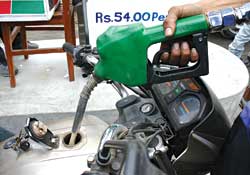 Things haven't changed much in the three years since this paper started carrying investigative reports on oil dealers and adulteration ('Nepal oil corruption' #19). When the government recently announced that it was going to remove kerosene dealerships out of gas stations, the oil barons called for a nationwide shutdown. As the gas lines grew, the government lost its nerve and gave in.
Things haven't changed much in the three years since this paper started carrying investigative reports on oil dealers and adulteration ('Nepal oil corruption' #19). When the government recently announced that it was going to remove kerosene dealerships out of gas stations, the oil barons called for a nationwide shutdown. As the gas lines grew, the government lost its nerve and gave in. The irony is that the oil sector is controlled and owned by the state. The end product is sold through distributors, most of whom have thoroughly greased palms for their dealerships. They adulterate the oil with subsidised kerosene to plump up profits. In the past 15 years or so, new cars, models and makes have entered the Nepali market. But even if a car owner were willing to pay premium prices for good fuel, there is none available.
The only things we can admire Nepali ingenuity for is using kerosene as a complete substitute for diesel. Nepal's kerosene consumption has increased two-fold in the past three years while other oil imports remain stagnant. Kerosene was subsidised for the poor till the fuel adulteration barons figured it could work as well in the automobile industry.
The government does not have any way to regulate kerosene. It keeps the prices of petrol high so that a cross subsidy on kerosene continues. The only answer is that the government remove itself from the business of importing and dealing in oil. Next, it must do away with subsidies and begin a coupon system for those who really need kerosene. This will make it next to impossible for industries or automobile owners to gather enough coupons to fill their tanks.
It's a pity that successive governments in Nepal avoided the subject of deregulation. It's a political hot potato that could create difficulties for their campaigns. But, since the present government does not intend to hold an election any time soon, there is no better time to implement some radical changes in the fuel industry.
We should learn from India. Indian consumers today have access to better products and distribution. Nepali oil dealers, like many other businesses, understand that the government indirectly protects their interests. If the sector is opened, they also realise the regional and international players who will jump in the game are not in the adulteration business. Surely, the answer is de-regulation of the sector and to treat the import, storage, distribution and retailing of oil products separately. Allow private sector entry into these businesses in a regulated manner and soon we'll have better oil and better air.
It is also important that consumer forums find better ways in dealing with the issue and really pressure the government to end the monopoly of a state player and a business cartel.



